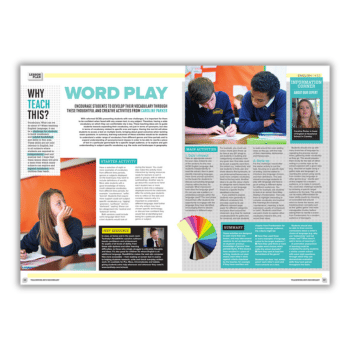Encourage students to develop their vocabulary through these thoughtful and creative ‘improving vocabulary’ KS3 activities from Caroline Parker…
It is important for students to be confident when faced with any unseen text, in any subject. Having a wide vocabulary on which they can comfortably rely is key.
These teaching ideas aim to guide students towards expanding their vocabulary, not just in terms of synonyms, but also in terms of vocabulary related to specific eras and topics.
Having this toolkit will allow students to access a text on multiple levels, bringing about good outcomes when tackling exam questions.
Improving vocabulary in KS3
When teaching English Language, it can be a challenge for students to build vocabulary and cement knowledge and skills in this area.
These skills are not only relevant to English, but to all subjects where students are required to independently read and analyse text.
Starter activity
Display a selection of eight or more examples of vocabulary from different time periods, genres or subjects on the board (you may want to include definitions of words).
Ask more able students with a good knowledge of history to categorise vocabulary from different time periods; for example: ‘countenance’, ‘selfie’, ‘bonnet’.
Ask students that require more support to sort subject-specific vocabulary e.g. ‘rigging’, ‘greenery’, ‘sunflower’ ‘anchor’, ‘starboard’, ‘sapling’ (these can be categorised into ‘nautical and ‘botanical’ terms).
Include some language from a text you’re going to look at during the lesson. Make this activity more interactive by having resources ready for learners to sort in pairs or groups, with or without subheadings.
Another way to go about this is to hand each student two or more words to stick into a category displayed around the classroom.
After the activity, give students time to reflect on the task and consider reasons why it is important to understand different language.
Look further into why writers may have chosen specific terminology. Discuss how confident pupils would feel at identifying text as being from a particular period, genre or subject.
Caroline Parker is head of English at Hazelwick School in Crawley. Browse more KS3 English reading and writing lesson plans and ambitious vocabulary resources.














